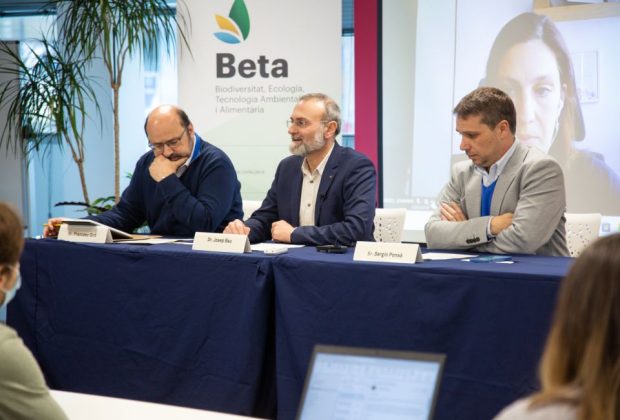The Med4Waste project brings together five projects on composting in urban waste management in the Mediterranean in Vic
Med4Waste is a capitalisation project that aims to promote innovative practices, with a focus on preventing and reducing waste generation.

A debate on various experiences and pilot tests on the incorporation of composting as the main technology for the management of organic waste was the epicentre of the conference that the BETA Technology Centre of the University of Vic – Central University of Catalonia (UVic -UCC) organised this Thursday in Vic. The event, which took place in the framework of the Med4Waste project, has served to meet a wide representation of projects that are working in the north and south of the Mediterranean to incorporate new models of municipal organic waste management. These projects, funded by the ENI CBC Med programme, are DECOST, CLIMA, MEDINA, REUSEMED and SIRCLES.
Med4Waste, with a consortium of seven organisations from six different Mediterranean countries, is a capitalisation project that aims to promote innovative practices, with a focus on preventing and reducing waste generation, circular economy practices and organic waste management. Med4Waste also provides guidance and training for public administrations and stakeholders in the Mediterranean region, helps disseminate key results, promotes networking and fosters long-term commitment to sustainable growth.
During this morning’s event, Sergio Ponsá, director of CT BETA, commented: “We are pleased with the success of the DECOST project and now we hope that Med4Waste will help to disseminate these kinds of new experiences in waste management throughout the Mediterranean”. Ponsá also stressed that “projects like Med4Waste are an example of how we try to help build new opportunities”.
Francesc Giró, strategic director of the Catalan Waste Agency, congratulated all those present for the success of the models that have been tested in all the current projects. He remarked that “this type of organic waste management models are possible and make sense if they are applied to the different realities of the region”. Giró stressed that organic waste management can play a key role in some of the challenges facing the Mediterranean region, such as soil degradation and erosion. “The main challenge and opportunity is to give continuity to these pilots.
Joumana Sweiss, representative of the ENI CBC Med programme, commented that projects such as those presented today “help to change people’s mentality”, and highlighted the fact that town councils, schools and associations have become involved in order to put people at the centre.
For his part, Josep Bau, Vice-Rector for International Relations at UVic-UCC, explained that projects such as Med4Waste “are an example of the line in which UVic-UCC wants to work to meet its objectives and have a real impact on society and people. For Bau, waste management “is a complex challenge, which can only be achieved by working at an international level, but without losing sight of the fact that it is necessary to have an impact at all levels, as CT BETA does in projects like this one”.
Inventory of good practices
The event has allowed to give voice to a series of pilot experiences that have served to assess the potential of incorporating composting in the dynamics of the collection and management of municipal organic waste in Mediterranean villages. The main content of the conference was provided by the DECOST project partners, who presented the results obtained after the implementation of several variants of community composting in Catalonia, Jordan, Palestine and Italy. From Catalonia, the SIRCLES project, coordinated by the ARC and which is also testing some variants of the same system, was also present.
The group of participants, both on-site and online, provided the opportunity to compare the reality of similar systems in countries with very different realities, and to present the positive impacts of the new waste management models in different contexts, the barriers and difficulties that the economic and technical viability of the pilots have had to overcome and whether they have had to face administrative difficulties.
This exchange of experiences has given Med4Waste the opportunity to improve the set of policy recommendations it is working on, and to continue offering guidance and training to public administrations and private actors who have already shown interest in the results of these projects. So far, Med4Waste has launched some mentoring campaigns aimed at local administrations, while a catalogue of good practices to improve municipal waste management is being created with a focus on the reality of the Mediterranean.
